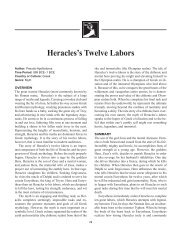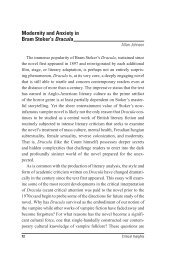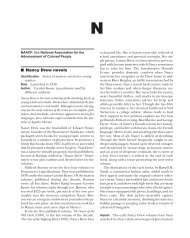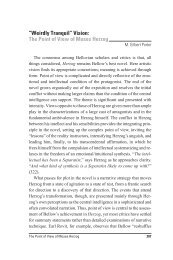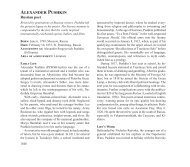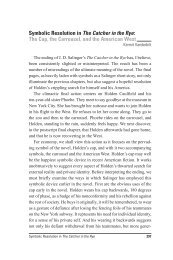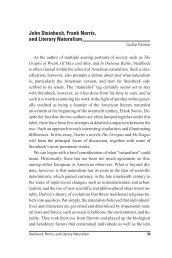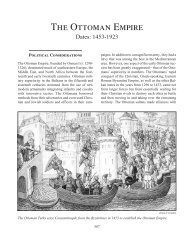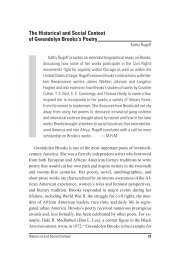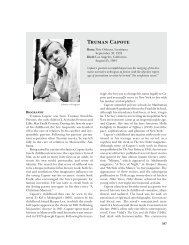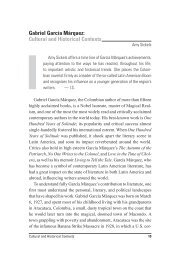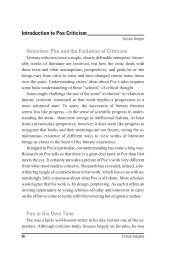“A Fragment of Lost Words”: Narrative Ellipses in The ... - Salem Press
“A Fragment of Lost Words”: Narrative Ellipses in The ... - Salem Press
“A Fragment of Lost Words”: Narrative Ellipses in The ... - Salem Press
Create successful ePaper yourself
Turn your PDF publications into a flip-book with our unique Google optimized e-Paper software.
“We talked for a moment about some wet, gray little villages <strong>in</strong><br />
France” (47). Aspir<strong>in</strong>g writers are <strong>of</strong>ten given the advice to show, not<br />
tell. One could imag<strong>in</strong>e the students <strong>in</strong> a fiction writ<strong>in</strong>g workshop object<strong>in</strong>g<br />
to Nick’s l<strong>in</strong>e as an example <strong>of</strong> “tell<strong>in</strong>g,” and suggest<strong>in</strong>g that<br />
the author ought to “show” the two veterans discuss<strong>in</strong>g their war stories.<br />
In not mention<strong>in</strong>g the specific towns the men talked <strong>of</strong> and the action<br />
they saw, Nick deflates this open<strong>in</strong>g conversation with Gatsby. Of<br />
course, this is precisely the effect Nick <strong>in</strong>tends: he is uncomfortable<br />
be<strong>in</strong>g at the center <strong>of</strong> the story (or narrative discourse, to be precise),<br />
and moves the discourse speedily over the events that illum<strong>in</strong>ate his<br />
own story rather than Gatsby’s.<br />
Nick is acutely observant and accurate <strong>in</strong> chronicl<strong>in</strong>g the dreams<br />
and desires <strong>of</strong> the people around him, and it is not entirely wrong for<br />
him to claim, “Every one suspects himself <strong>of</strong> at least one <strong>of</strong> the card<strong>in</strong>al<br />
virtues, and this is m<strong>in</strong>e: I am one <strong>of</strong> the few honest people that I have<br />
ever known” (59). Yet he is far less scrupulous when it comes to the<br />
facts <strong>of</strong> his own story. Biographical details <strong>of</strong> his life enter the text only<br />
because other characters ask after them. In his conversations with<br />
Daisy and Gatsby, Nick f<strong>in</strong>ds himself <strong>in</strong> a narrative double-b<strong>in</strong>d: while<br />
he would prefer to omit <strong>in</strong>formation about himself, he feels bound<br />
faithfully to represent the conversations he has had with his cous<strong>in</strong> and<br />
his neighbor. Nick’s strategy, therefore, is to summarize and compress<br />
his responses to these questions so as to give them as little space <strong>in</strong> the<br />
discourse as possible. Hav<strong>in</strong>g seen this process at work twice, the<br />
reader ought to beg<strong>in</strong> wonder<strong>in</strong>g what else Nick has chosen to omit<br />
from his narrative, what else might come to light if only someone were<br />
to ask him about it.<br />
One might chalk these omissions up to modesty, were it not for<br />
Nick’s tak<strong>in</strong>g a similar approach when he and Tom come upon the<br />
scene <strong>of</strong> the car accident toward the novel’s climax. Nick, who has always<br />
been reticent to talk about himself, chooses not to talk to the police<br />
or to Wilson <strong>of</strong> what he knows. Assum<strong>in</strong>g the role <strong>of</strong> passive witness,<br />
he allows Tom to deflect Wilson’s suspicions away from himself<br />
<strong>“A</strong> <strong>Fragment</strong> <strong>of</strong> <strong>Lost</strong> <strong>Words”</strong> 195



